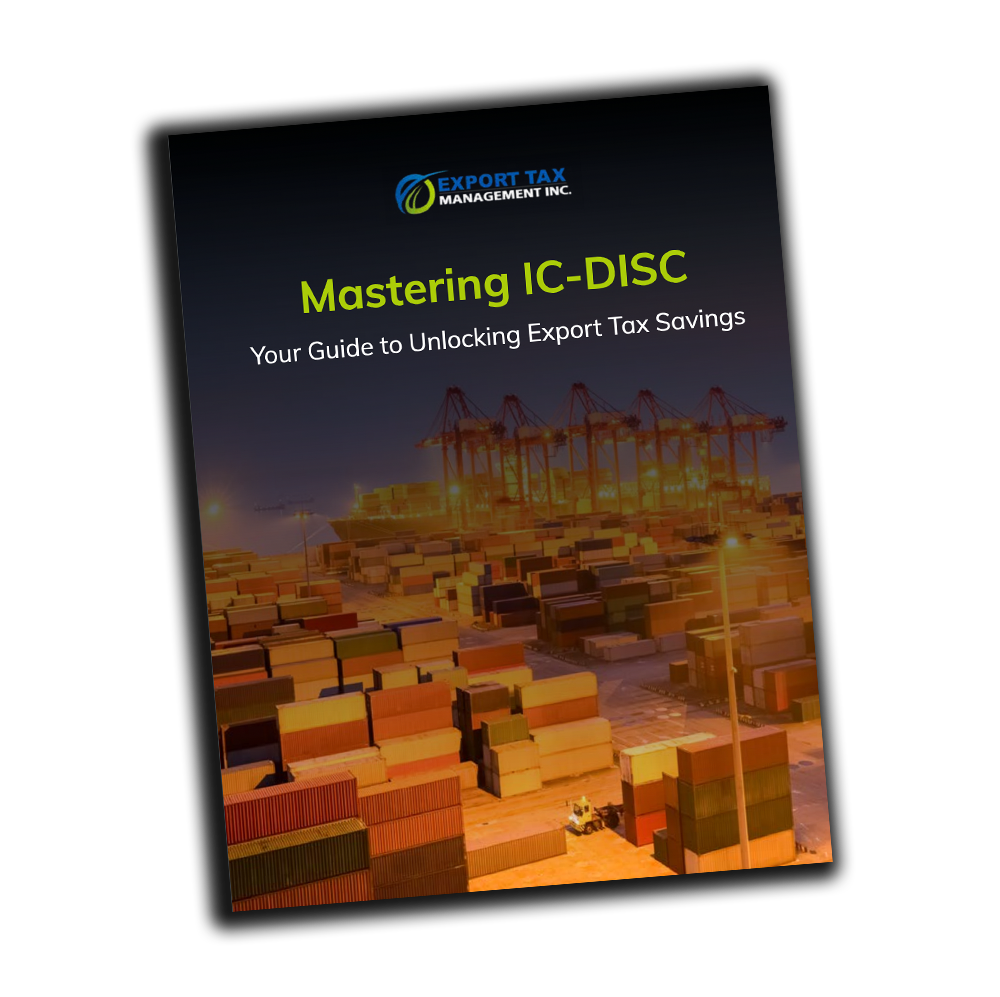IC-DISC No Loss Rule – What Exporters Must Know
One overlooked rule can wipe out your IC-DISC tax savings.
For U.S. exporters using the Interest Charge Domestic International Sales Corporation (IC-DISC) structure, the opportunity for federal tax savings is significant. But so are the compliance risks.
The IC-DISC No Loss Rule is one such risk, and it’s often misunderstood or entirely overlooked until it’s too late. This rule restricts when commissions can be paid to an IC-DISC, and failure to comply may result in loss of tax benefits or IRS penalties. In this article, you’ll learn what the IC-DISC No Loss Rule is, how it works, and how to ensure your export transactions remain compliant.
To learn more about the fundamentals of this powerful tax incentive, see our complete IC-DISC overview.
Table of Contents
- What Is the IC-DISC No Loss Rule?
- Why Exporters Must Pay Attention to This Rule
- How the Rule Applies in Commission Calculations
- Related Supplier Transactions and the Rule’s Reach
- Common Mistakes Exporters Make
- Strategic Planning to Stay Compliant
- IRS Compliance and Reporting Requirements
- Example: Fixing a No Loss Rule Violation
- FAQs
- Conclusion
What Is the IC-DISC No Loss Rule?
The IC-DISC No Loss Rule is a provision under Internal Revenue Code §994 that prohibits exporters from including export transactions with losses in their IC-DISC commission calculations.
Only profitable export sales may be used to calculate the commission due to the IC-DISC. This rule protects the integrity of the IC-DISC structure by ensuring companies don’t manipulate pricing to generate artificial tax benefits through related-party transactions.
Legislative Background
This rule is grounded in IRC §994 and expanded on by Treasury Regulations. These rules outline the commission calculation methods and prohibit commissions on export transactions where the combined taxable income is zero or negative.
You can explore these technical details in the IRS IC-DISC Form 1120 instructions, which clarify the necessary documentation and compliance expectations for IC-DISC entities.
Purpose of the Rule
The IC-DISC No Loss Rule exists to prevent abuse of the export tax benefit, particularly when related-party transactions are involved. It enforces fair application of transfer pricing methods and ensures that only truly profitable export activities receive the commission benefit under IC-DISC rules.
Why Exporters Must Pay Attention to This Rule

Ignoring the IC-DISC No Loss Rule can lead to serious consequences:
- Disqualification of your IC-DISC structure
- Reversal of previously claimed tax savings
- Risk of penalties and interest following an IRS audit
Even small mistakes in how you calculate combined taxable income or allocate costs between related parties can result in a commission being disallowed. Exporters must understand that the rule is not merely a technicality, it’s a core compliance requirement that directly impacts tax outcomes.
According to the Journal of Accountancy’s guide on IC-DISC compliance issues, even seemingly minor oversights in documentation or aggregation can attract unwanted IRS attention.
How the Rule Applies in Commission Calculations

IC-DISC commissions are typically calculated using one of two IRS-approved methods:
- 4% of gross export receipts
- 50% of combined taxable income (CTI)
However, the IC-DISC No Loss Rule applies to both. If a transaction or group of transactions results in a loss, it cannot be included in either method’s commission calculation. This means loss-generating transactions must be excluded both from gross receipts and associated costs.
Example
Suppose your company sells two products overseas. Product Line A generates $300,000 in profit; Product Line B results in a $100,000 loss. Under the No Loss Rule, you must exclude the unprofitable segment from your IC-DISC commission base, even if the combined total would still yield a net gain.
Failing to isolate these transactions is a common mistake. For help ensuring your commission structure is fully compliant, see our article on IC-DISC commission calculation methods.
Related Supplier Transactions and the Rule’s Reach
The IRS applies the IC-DISC No Loss Rule with heightened scrutiny when a related supplier is involved. This includes:
- Parent-subsidiary structures
- Entities in a controlled group
- Partnerships and S corporations under common ownership
In such cases, the IRS expects transactions to be priced at arm’s length. If companies attempt to shift profits or losses between entities to inflate IC-DISC commissions, they are likely to trigger a compliance issue.
For companies operating in complex ownership structures, it’s essential to understand how IC-DISC rules on commission payment structures intersect with transfer pricing regulations.
Common Mistakes Exporters Make
Most violations of the IC-DISC No Loss Rule are preventable. These are the most common errors:
- Combining profitable and unprofitable transactions into a single pool for commission calculation
- Misallocating indirect costs, leading to apparent losses where none exist
- Inadequate documentation of related-party pricing or cost-sharing agreements
Many businesses unknowingly disqualify themselves from IC-DISC benefits by failing to separate transactions or apply proper accounting practices. You can avoid these issues with a structured approach, as detailed in our guide to maximizing IC-DISC benefits.
20+ Years IC-DISC Experience
Unlock Significant Tax Benefits with IC-DISC
Our objectives are simple: to provide you with maximum export tax savings, while delivering unmatched personal attention by our staff of CPAs. Schedule a free consultation today to discuss how Export Tax Management can help you.
Schedule Free ConsultationStrategic Planning to Stay Compliant
The best way to comply with the IC-DISC No Loss Rule is to build your IC-DISC strategy around transaction-level profitability.
Key planning strategies include:
- Segregating export sales based on profitability
- Structuring contracts to clearly allocate costs and pricing between entities
- Conducting regular reviews with a CPA who specializes in IC-DISC planning and compliance
Companies with related entities should also review their internal pricing and reporting to avoid triggering IRS scrutiny. For more on long-term strategies, visit our page on IC-DISC tax strategy planning.
IRS Compliance and Reporting Requirements

Proper documentation is essential to demonstrate compliance with the IC-DISC No Loss Rule, especially during an IRS audit.
Required forms and documentation include:
- Form 1120-IC-DISC
- Schedule P, detailing intercompany commissions
- Transaction-level profit analysis
- Cost-sharing agreements and transfer pricing support
To avoid costly errors, follow our detailed guide on how to file Form 1120-IC-DISC correctly and review the 1120-IC-DISC filing instructions.
Example: Fixing a No Loss Rule Violation
A U.S.-based manufacturer of heavy equipment established an IC-DISC and calculated commissions based on all export sales. During a routine IRS review, auditors discovered that some of the transactions included in the commission base resulted in losses.
What Went Wrong:
- The company failed to apply the IC-DISC No Loss Rule.
- Loss-generating product lines were not excluded.
- $350,000 in IC-DISC commissions were disallowed.
Resolution:
The company restructured its commission methodology to comply with the rule. It removed unprofitable transactions, revised its documentation, and filed amended returns. The IC-DISC structure was preserved, and compliant commission payments resumed.
Explore more real-world results like this in our detailed IC-DISC example case study.
If you want to take your international business to the next level, IC-DISC is the answer. Check out our related articles:
FAQs
No, under the IC-DISC No Loss Rule, commissions may only be calculated on profitable export transactions.
If your company and the supplier are part of the same corporate group or have common ownership, the IRS considers them related parties.
You could face penalties, back taxes, or even disqualification of your IC-DISC. Working with a specialist is the best way to avoid compliance issues.
While the IC-DISC No Loss Rule applies uniformly, S Corps and partnerships may face additional complexity in cost allocation and reporting.
See more common questions and answers in our IC-DISC FAQs.
20+ Years IC-DISC Experience
Unlock Significant Tax Benefits with IC-DISC
Our objectives are simple: to provide you with maximum export tax savings, while delivering unmatched personal attention by our staff of CPAs. Schedule a free consultation today to discuss how Export Tax Management can help you.
Schedule Free ConsultationConclusion
While the U.S. does not directly tax exports, the IC-DISC No Loss Rule is a critical compliance requirement that can make or break your tax savings strategy.
Companies that ignore this rule risk losing valuable tax benefits, incurring penalties, and attracting IRS scrutiny. On the other hand, exporters who apply the rule correctly, by isolating profitable transactions and ensuring proper cost allocation, can continue to reap significant tax advantages. Don’t take chances with your export tax strategy.
Contact Export Tax Management today for expert guidance on maintaining compliance with the IC-DISC No Loss Rule and maximizing your IC-DISC benefits.




